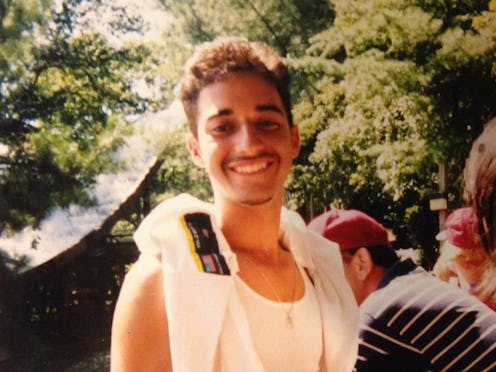Entertainment
Could Adnan Syed's Conviction Be Overturned?

If you're still asking yourself, "But what about the Nisha call?," Then you'll be interested to know that there's a new development in Adnan Syed's case that his attorney thinks could overturn his client's conviction. The Baltimore Sun reported on Monday that Syed's defense attorney filed a motion to have questionable cell-phone records overturned — namely, the incoming-call records that were used to place Syed at the location where Hae Min Lee's body was buried.
"[C. Justin] Brown contends that cellular carrier AT&T included a warning about the accuracy of cell tower data on a fax cover sheet to Baltimore police. 'Outgoing calls only are reliable for location status. Any incoming calls will NOT be considered reliable information for location,' the note read." It's probably the most groundbreaking new development in Syed's case since Serial, which detailed the 1999 murder and raised questions about Syed's conviction, aired its final episode "What We Know" in December.
According to the Sun, Brown believes that the key in this motion is the fax cover sheet from AT&T, which gives a disclaimer that incoming call records are unreliable. "If that warning had been "properly raised at trial" by Syed's previous defense attorney, Brown wrote, "much of, if not all of, the cellular evidence would have been rendered inadmissible." Why is this important? Because those incoming calls were what placed Syed at Leakin Park with Jay Wilds, where his ex-girlfriend Hae Min Lee's body was later discovered. Syed, 35, is serving a life sentence for the murder of Lee, and his conviction was largely centered on Jay Wilds' testimony and these very cell phone records that Brown filed a motion to have overturned.
What does that mean for Syed's case for appeal? It's hard to tell, as the motion was just filed on Monday, but it comes after many other developments in Syed's appeals case. The last big break was in May, when Rabia Chaudry, lawyer and family friend of the Syeds who originally brought the fifteen-year old case to Serial host Sarah Koenig's attention tweeted news that Syed's case had successfully been remanded.
Brown filed the motion for the Maryland Circuit Court of Appeals to remand the case, citing Asia McClain as his main argument. McClain reportedly saw Syed at the library on the day of Lee's murder, and, later, wrote two letters to him in jail — but she was never brought to trial as a potential alibi witness by Syed's attorney, Christina Gutierrez. A remand does not guarantee a new trial, but does allow the defendant the right to apply for the case to be re-opened.
The remand was successful, and also re-asserted the suspicions that Gutierrez was not fit for trial in 1999 when she defend Adnan in court. And, as I ask every time there's a break in Syed's case: what's going through Sarah Koenig's head right now? After the final episode aired, Koenig was criticized for the "slanted" truth she presented, many accusing her of being outwardly biased towards Syed, trying to prove his innocence.
Koenig told Fresh Air's Terry Gross in December that she never expected Serial to reach such acclaim, and certainly not become the most popular podcast in history — nor did she have an agenda: "I'm not here to exonerate Adnan. I'm here to report this story," she said. It's a story that gets more and more intricate the more details come to light.
Image: Serial Podcast